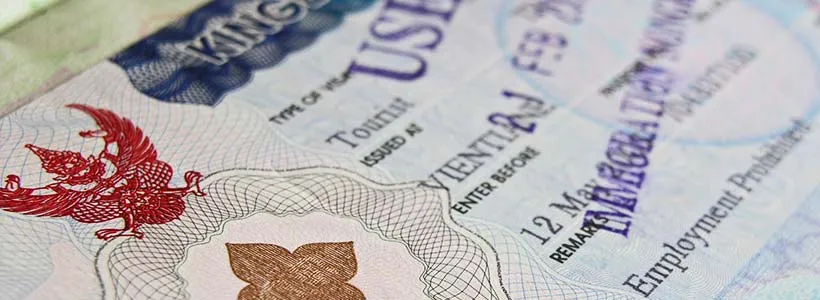From Work to Wat: How to Secure a Peaceful Retirement in Thailand

Picture this: the sound of a temple bell ringing in the distance, the smell of fragrant Thai street food wafting through the air, and a gentle tropical breeze rustling the palm leaves. For many people, this is the ideal setting for retirement—and Thailand is one of the most popular destinations to make that dream a reality.
But, before you can enjoy life in the “Land of Smiles,” there’s a key element to navigate: the Thailand retirement visa. With its beautiful beaches, rich culture, low cost of living, and world-class healthcare, Thailand offers retirees a peaceful and fulfilling life. The good news? Securing a retirement visa is more accessible than you might think, as long as you know the steps to take.
Let’s walk through everything you need to know about securing a peaceful retirement in Thailand, from understanding the visa requirements to finding the perfect place to live.
Why Choose Thailand for Retirement?
Before we dive into the technicalities of the visa process, let’s explore why Thailand has become such a popular destination for retirees:
-
Affordable cost of living: Whether you’re looking to live in a bustling city or a quiet beach town, your money can go much further in Thailand than in many Western countries.
-
Amazing healthcare: Thailand’s private healthcare system is top-notch, offering high-quality care at a fraction of the cost compared to the United States or Europe.
-
Vibrant culture: From golden temples (Wats) to rich traditions and festivals, Thailand’s culture provides both peaceful contemplation and lively entertainment.
-
Great weather: Warm, tropical weather year-round means you can escape the chill of winter and enjoy outdoor living all year long.
-
Strong expat communities: Major cities like Chiang Mai, Bangkok, and Hua Hin have thriving expat communities, offering a mix of international and local cultures.
So, what’s the best way to secure a visa to stay long-term? Let’s get into it.
The Thailand Retirement Visa: Your Ticket to a Peaceful Life
The Thailand Retirement Visa is officially called the Non-Immigrant O-A Visa. It’s a long-term visa designed for foreigners who want to retire in Thailand. This visa allows you to stay in the country for one year at a time, with the possibility of renewal.
Eligibility Requirements for the Retirement Visa
To qualify for the Thailand retirement visa, you must meet the following criteria:
-
Age: You must be at least 50 years old when applying.
-
Financial Requirements: You must demonstrate one of the following financial conditions:
-
800,000 Thai Baht (~USD 22,000) in a Thai bank account, held for at least two months prior to applying, or
-
A monthly income or pension of at least 65,000 Thai Baht (~USD 1,800), or
-
A combination of both financial means, totaling 800,000 Baht annually.
-
-
Health Requirements: You must have a basic medical certificate proving you do not have any major communicable diseases.
-
Police Record: You will need a clean police record from your home country to ensure you’re not barred from entry based on criminal activity.
Once you’ve met these requirements, you can start the application process.
The Application Process: Step-by-Step
There are two main types of retirement visas in Thailand: the Non-Immigrant O-A Visa (for applicants outside Thailand) and the Non-Immigrant O Visa (for those already in Thailand who want to apply for an extension). Below is the process for applying for the O-A visa:
If Applying from Outside Thailand (O-A Visa)
-
Apply at a Thai Consulate or Embassy: You must submit your application at a Thai consulate or embassy in your home country.
-
Submit Documents: You’ll need to provide a passport (valid for at least a year), recent passport photos, proof of financial eligibility (bank statement, pension letter, etc.), police clearance certificate, health certificate, and proof of health insurance.
-
Wait for Approval: Once approved, you’ll receive a one-year retirement visa. You can enter Thailand using this visa, and it’s valid for multiple entries.
-
90-Day Reporting: After arriving in Thailand, you’ll need to report your address to Thai immigration every 90 days.
If Applying Inside Thailand (O Visa + Extension)
-
Enter Thailand on a Tourist Visa or Visa Exemption: Once in Thailand, you can apply for the extension.
-
Open a Thai Bank Account: You’ll need a Thai bank account with the required balance (800,000 Baht or monthly income of 65,000 Baht).
-
Apply at Immigration: After two months of holding the required funds in your Thai bank account, you can apply for the retirement visa extension at your local immigration office.
-
Receive One-Year Extension: Once approved, you’ll receive a one-year extension to stay in Thailand, with annual renewals.
Health Insurance Requirement
For the O-A visa, you’ll need health insurance with a minimum coverage of 40,000 Baht for outpatient care and 400,000 Baht for inpatient care. You can purchase health insurance through a Thai provider, or some international insurers also meet the requirements.
90-Day Reporting and Other Obligations
Once you’re in Thailand, you’ll need to comply with the 90-day reporting requirement. This means checking in with Thai immigration every three months to confirm your address and visa status.
Additionally, you must renew your visa annually to continue your stay. The renewal process is straightforward, as long as you continue to meet the financial and health requirements.
Where to Live: The Best Locations for Retirees
Thailand is full of diverse places to live, each offering its own advantages. Here are a few popular spots for retirees:
-
Chiang Mai: A peaceful city surrounded by mountains, Chiang Mai is a favorite for retirees looking for a laid-back lifestyle. It boasts a low cost of living, excellent healthcare, and a vibrant expat community.
-
Bangkok: Thailand’s capital is fast-paced and modern, with all the amenities of a cosmopolitan city. It’s perfect for those who want easy access to international flights, shopping malls, restaurants, and entertainment.
-
Hua Hin: A beach resort town popular with retirees, Hua Hin is quieter than the big cities but still offers great facilities and services.
-
Phuket: Thailand’s largest island is known for its beaches, luxury resorts, and expat-friendly atmosphere. Ideal for retirees who want to be close to the sea.
-
Koh Samui: Another popular island destination, Koh Samui offers an idyllic lifestyle with beautiful beaches, while still maintaining a vibrant expat community.
Final Thoughts: A Peaceful Retirement Awaits
Retiring in Thailand is more than just a dream—it’s a tangible goal that thousands of people have already turned into a reality. With the right visa, a little preparation, and the knowledge of the process, you can secure a peaceful retirement surrounded by stunning landscapes, rich culture, and all the amenities you need.
Whether you want to live by the beach, explore the mountains, or immerse yourself in a vibrant city, Thailand offers something for every retiree. So, if you’re ready to move from work to Wat (temple), Thailand might just be your perfect paradise.



